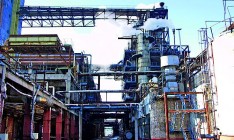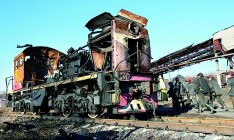Economy
trendsLack of reforms and the military conflict threw Ukraine’s economy five years back

Very few of the forecasts made by economists and members of the Cabinet of Ministers at the beginning of this year were justified. Hardly any of them managed to predict the collapse of the economy due to the war in the Donbas, annexation of Crimea and the hyper devaluation of the hryvnia. Back in January, shortly before the mass protests and change of power, the government expected GDP growth through an increase in consumption and re-establishment of exports to Russia. In reality, everything was quite the opposite.
Throughout the year the new government was forced to revise financial calculations on more than one occasion. In its latest forecast the Ministry of Finance predicted that the decline of the economy in 2014 would be 6.5%. The negative GDP indicator was also predicted for next year. The economy will be able to break even no earlier than September-October 2015, believes Head of the Analytical Department at SP Advisors Vitaliy Vavryshchuk and only if the situation in the Donbas does not deteriorate.
Price collapse
This year, on the background of the falling hryvnia the prices of practically all goods went through the roof – from food products to industrial goods. Over 11 months, consumer prices in the nation’s capital soared 21.2% nearly catching up with the level of inflation five years ago. In the beginning of January, when the State Statistics Service publishes the data for the entire last year, the final figure of this indicator may set yet another record. According to the forecast of NBU Governor Valeria Hontareva, inflation may reach 25%.
Not only prices of imported goods increased this year. Ukrainian manufacturers using imported components and raw materials were also forced to raise their prices. The prices of agricultural products also increased due to the sharp rise in the prices of gasoline. It is not surprising that on the background of galloping inflation the volume of retail sales dropped. Over 11 months goods turnover decreased 7.5% in comparable prices, although in monetary terms sales increased primarily due to the rise in prices. The confidence of Ukrainians consumers also fell due to their fears of unemployment and further weakening of the hryvnia, according to the report of GfK Ukraine. The level of incomes also did not add much optimism. Since the start of the year the average wage of Ukrainians increased by slightly more than 10% from UAH 3,148 to UAH 3,509, while prices grew twice as fast (21.2%).
Jump in feet first
It has been an ambiguous year for the industry. For instance metallurgical plants earned high profits due to the rise in prices. However, due to the increased value of raw materials and re-evaluation of currency loans companies will sustain major losses based on the results of the year instead of closing it out with profits. Over nine months of 2014 the negative financial result of industrial enterprises exceeded UAH 79 bn. In addition, many companies suffered from the events in the Donbas. As a result of the military actions the operation of a number of enterprises was suspended and the infrastructure of plants and roads leading to them were destroyed.
At one of the first sessions of the new government Premier Arseniy Yatsenyuk said the “economy is mainly suffering from the war in the east”. “The figures that we have today point to only one thing: there is an objective decline in industrial production, decrease of the GDP, devaluation of the national currency and a decline in state reserves,” said the premier.
It is very convenient to blame the war for the economic collapse. There are, however, questions to the government as well. Analyzing the data of a survey of companies in Q3 the European Business Association (EBA) drew the conclusion that businesses began skeptically viewing any promises of the government. Executive Director of the EBA Anna Derevyanko says companies are suffering from the lack of true reforms. In addition to that, some top managers polled by the EBA pointed to a rise in the level of corruption and preservation of shadow schemes of the past.
Hitting rock bottom
The decline in foreign investments has dealt a serious blow to the Ukrainian economy. This was mainly due to the currency difference. Over 9 months non-residents invested US $1.91 bn in Ukraine and withdrew US $0.89 bn. However, the negative rate difference amounted to US $ 9.41 bn. Based on the results of three quarters of 2014, the volume of accumulated foreign direct investments (FDI) amounted to US $48.52 bn, which is US $4.47 bn less than at the start of the year.
Without the money of foreign investors and due to the decline in export Ukraine received very little hard currency, while the NBU had to use its foreign exchange reserves to settle for gas and repayment of debts. The central bank even had to sell gold. As a result, by December 1 the gold and foreign exchange reserves of the country were only US $9.97 bn. The reserves were lower only in December 2004 – at UAH 9.715 bn. The dollars in the NBU reserves were partially directed at interventions to maintain the stability of the hryvnia. This, however, did not bring about the desired result and after the parliamentary elections the NBU practically stopped selling hard currency.
Debt train
The current condition of reserves raises concerns not only from the point of view of exchange rate fluctuations, but also due to the upcoming payments on the national debt. Based on preliminary calculations of the Ministry of Finance, the government will have to pay over UAH 207 bn next year, which is nearly 20% more than this year. Moreover, the debt is inexorably growing due to devaluation and new borrowings. This year Ukraine has set a very low record – the national debt guaranteed by the state will exceed 65% of the GDP based on the results of the year. The country cannot afford to borrow any more. However, without the borrowed funds it will not be able to repay the old debts. The default of the country is becoming more realistic with every day. That is why the government is hoping for loan tranches from the IMF, which will serve as a parachute for the economy of Ukraine, though they are not likely to give the country a chance to climb back on board.






 of the agreement of syndication with Financial Times Limited are strictly prohibited. Use of materials which refers to France-Presse, Reuters, Interfax-Ukraine, Ukrainian News, UNIAN agencies is strictly prohibited. Materials marked
of the agreement of syndication with Financial Times Limited are strictly prohibited. Use of materials which refers to France-Presse, Reuters, Interfax-Ukraine, Ukrainian News, UNIAN agencies is strictly prohibited. Materials marked  are published as advertisements.
are published as advertisements.